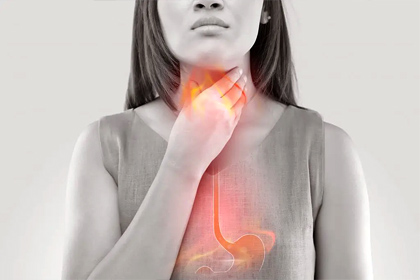Early esophageal cancer usually does not cause symptoms, occasionally with nerve irritation symptom. With disease progression, the frequency of esophageal cancer symptoms will increase, mainly including: foreign body sensation, dysphagia, and pain. However, the initial symptoms are mild and easily overlooked, thereby delaying treatment.
If you want to know the symptoms of early esophageal cancer, please communicate with us immediately, and we will invite esophageal cancer experts to answer your questions.
Five common symptoms of esophageal cancer
Symptom 1: Substernal stuffiness or mild pain.
This symptom does not occur continuously, but intermittently or after fatigue or when eating quickly. The esophagus itself is peristaltic at all times, and this symptom occurs only when the peristalsis reaches the lesion site.
Symptom 2: Foreign body sensation when swallowing food.
During the swallowing process, food (especially dry hard food) passing through the lesion area (of small size) may produce a foreign body sensation, often at the same location. However, because it is mild and intermittent, the symptom is easily ignored.
Symptom 3: Slow swallowing with a sense of retention.
This symptom is mainly manifested as a feeling of retention in a certain part of the patient when swallowing food. This situation is not persistent, but gradually becomes apparent with progression of the disease.
Symptom 4: Chest stuffiness or tightness.
This symptom is often accompanied by a sense of dryness in the throat, with chief complaint of always stuffiness in the front chest, like objects blocked, resulting in constriction sensation in the chest, which is obvious when swallowing food, but it does not affect normal life and work.
Symptom 5: Fullness and mild pain in the precordium, subxiphoid or upper abdomen.
This symptom is more obvious when eating dry hard food, but it does not happen every time and is intermittent.
Friendly reminder from cancer experts of Guangzhou Royallee Cancer Center:Go to a regular hospital for examination in time in case of any suspicious symptoms of esophageal cancer.
If you or your family members or friends have been diagnosed with esophageal cancer, please communicate with us immediately, and we will invite esophageal cancer experts to evaluate your condition and give detailed treatment recommendations.
Early detection and diagnosis of esophageal cancer will help to improve the treatment effect. Guangzhou Royal Cancer Hospital, in addition to providing advanced technical equipment, also has experienced experts, which can effectively improve the diagnosis rate of esophageal cancer and help improve the therapeutic effect.
What are the diagnostic methods for esophageal cancer?
Please be advised that in case of any suspicious symptoms of esophageal cancer, or if you are at high risk for esophageal cancer, see a doctor in time. The doctor will make a reasonable examination plan for you based on your symptoms, lifestyle, and family history to facilitate early detection of the disease. The main diagnostic methods are as follows:
1. Occult blood bead test: Occult blood bead is a simple and convenient screening method for esophageal cancer, which is more sensitive and accurate than fecal occult blood. Occult blood bead test is the preferred test if there are mild symptoms such as swallowing discomfort and food stagnation sensation.
2. Esophageal balloon cytology: a simple method, with less pain and high diagnostic positive rate, is used for high-risk populations for early esophageal cancer detection, providing important clues for its early treatment. Therefore, if any abnormality is found, further examination should be given immediately, or treatment should be performed under the guidance of a doctor.
3. Barium esophagography: the most commonly used clinical method for esophageal cancer detection, including X-ray barium meal angiography and double-contrast barium enema. It can better show the size of the lesion and the condition of esophagus with the surrounding tissues.
4. Esophagoscopy: It can be used to detect the location, size, classification and biopsy pathological diagnosis of tumor. After esophagoscopy for patients with middle-advanced stage related symptoms, the treatment plan can be developed according to the tumor classification and diagnosis result.
5. CT scan: It can be used to detect the invasion of esophageal tumors, the condition with surrounding organs, and enlarged lymph node. It is the main examination method for esophageal cancer staging and treatment plan.
6. PET-CT: PET-CT imaging is a precise fusion of anatomical imaging and functional metabolic imaging, which is of great help in the diagnosis, staging, guidance of treatment plans, and evaluation of therapeutic effect and prognosis of esophageal cancer.
Friendly reminder from experts of Guangzhou Royallee Cancer Center: when diagnosed with esophageal cancer, please do not panic, but receive active treatment, to restore health. At present, the treatment of esophageal cancer has made great progress. In addition to traditional surgery, radiotherapy and chemotherapy, there are many advanced minimally invasive techniques such as interventional therapy.
If you or your family members or friends have been diagnosed with esophageal cancer, please communicate with us immediately, and we will invite esophageal cancer experts to evaluate your condition and give detailed treatment recommendations.
The staging of esophageal cancer is mainly determined from three aspects.
The first is tumor size and the invasion condition, whether the tumor has invaded the full layer of the esophagus or just very superficial mucosa.
The second is the lymph node metastasis, determine the number of the surrounding metastatic lymph nodes, and the distance of the metastasis.
The third is whether or not distant metastasis. In addition, factors such as the pathological type, differentiation condition, and the location of the tumor should also be considered.
Different stage of esophageal cancer has different postoperative prognosis. Early esophageal cancer is when the tumor has just started and cancer cells have just appeared on the mucous membrane. At this time, the lesion is small and limited, and the surgical effect is very good. Esophageal cancer of middle stage is when the tumor cells begin to spread in the esophagus wall. At this time, the treatment is relatively troublesome, with increased operation area, and possible resection of the entire esophagus. Advanced esophageal cancer has spread beyond the esophageal wall and has metastasized to other parts, and surgery is considered not feasible, with poor prognosis.
In general, the prognosis of esophageal cancer is better for squamous cell carcinoma than adenocarcinoma; constrictive and fungating types are better than ulcerative and medullary types. The 5-year survival rate of patients with early esophageal cancer without metastasis and invasion is 60%, and the 5-year survival rate of patients with invasion and metastasis or esophageal cancer of middle segment is less than 25%.
After diagnosed with esophageal cancer, patients are quite sensitive to the question of how long they can live with advanced stage. Whether esophageal cancer can be cured or not depends on many factors. And how long patients with advanced stage can live also depends on the disease progression. The earlier the treatment, the more likely it is to control the disease, and the survival rate of patients with advanced stage is relatively low. Therefore, patients must start treatment as early as possible to control the disease and improve the survival duration.
The pathology report of esophageal cancer is an important basis for oncologists to make follow-up treatment plans. However, because the pathology report is very professional, many esophageal cancer patients and their families find it difficult to understand. In order to help you better understand the medical terms in the report, we have sorted out the common terms in the report for a preliminary interpretation.
For more information about the esophageal cancer report, you can make an appointment online or call us directly, and professional oncologists will be dedicated to answer your questions.
1. What does adenocarcinoma mean?
Adenocarcinoma is a cancer arising from gland cells. In the esophagus, adenocarcinomas can arise from cells in Barrett's esophagus.
2. What does squamous cell carcinoma mean?
The inner lining of the esophagus is called mucosa. Much of the mucosal layer in the esophagus is composed of squamous cells, which is called squamous mucosa. Squamous cells are flat thin cells that resemble fish scales when viewed under a microscope. Esophageal squamous cell carcinoma is a cancer that arises from the squamous cells.
3. In addition to cancer, what does it mean by Barrett, goblet cell or intestinal metaplasia in the report?
Goblet cells are usually found in the inner lining of intestine, not the esophagus. When goblet cells are found in a place where they shouldn't be (such as the esophageal mucosa), it's called intestinal metaplasia. Intestinal metaplasia can occur at any site with normal mucosal formation. When intestinal metaplasia replaces the squamous epithelium, it is called Barrett's esophagus. The most common cause of Barrett's esophagus is reflux of gastric contents back into the esophagus, which is often called gastroesophageal reflux disease (GERD).
4. What does invasive or infiltrating mean?
Invasive or infiltrating means that cancer cells have grown beyond the muscosa (the inner lining of the esophagus). This means that it is a true cancer and not a pre-cancer.
5. What does differentiation mean?
Differentiation or grade of a tumor depends on how abnormal the tumor cells and tissues look under a microscope. It’s an indicator of how quickly a tumor is likely to grow and spread. In general, esophageal cancer is assigned a grade of 1, 2 or 3:
• Well differentiated (low grade)
• Moderately differentiation (intermediate grade)
• Poorly differentiated (high grade)
Sometimes a grade of 1 or 2: moderately differentiated, poorly differentiated.
6. What does the grade of cancer mean?
Grade is one of many factors that help indicate how likely the cancer is to grow and spread. Poorly differentiated (high-grade) cancers tend to grow and spread faster, while well-differentiated (low-grade) cancers tend to grow at a slower rate. However, other factors are also important.
7. What does it mean if the report mentions vascular invasion or lymphatic invasion?
It indicates the presence of cancer in the blood vessels and/or lymph vessels of esophagus. If cancer cells have grown into these blood vessels, it increases the risk of the cancer traveling outside the esophagus, which, however, is not equal to a cancer metastasis. Consult a doctor for specific circumstances.
If you have any doubts about the pathology report of esophageal cancer, you can make an appointment online or call us directly, and professional oncologists will be dedicated to answer your questions.
Friendly reminder from cancer experts of Guangzhou Royallee Cancer Center: The above is only a partial interpretation of the pathology report of esophageal cancer. For a detailed pathology report, see a professional oncologist for a comprehensive interpretation, so that patients can receive timely guidance and treatment to avoid irreversible consequences of misdiagnosis and mistreatment.
In Royallee Cancer Center, a variety of advanced treatment methods are available, including minimally invasive surgery, laparotomy, chemotherapy, targeted drug therapy, immunological biological therapy, radiological interventional therapy and traditional Chinese medicine treatment, to achieve the best curative effect for patients.
Traditional treatments for esophageal cancer
1. Surgery: Surgery is the most common treatment method, which can be divided into palliative surgery and radical surgery for different conditions. Surgery can be used as a treatment for early local lesions of esophageal cancer, but the treatment effect is not ideal for middle-advanced esophageal cancer with distant metastases, and cancer cells are likely to remain after surgical treatment and cause recurrence.
2. Radiotherapy: Radiation therapy is mainly used for those who are not suitable for surgery and who do not have severe dysphagia. Radiation can be used to reduce tumor size before surgery, or to destroy remaining cancer cells after surgery.
3. Chemotherapy: Chemotherapy can control the progression of esophageal cancer systemically, and it can be given before surgery or radiotherapy to improve the effect, but it has certain toxic and side effects.
Innovative treatments for esophageal cancer
1. Vascular interventional therapy: With vascular interventional therapy, tumors are treated under imaging guidance such as X-ray fluoroscopy and digital subtraction angiography, by inserting catheter into tumor blood vessels, injecting chemotherapy drugs into tumors, and blocking tumor blood vessels at the same time. Featured with precise positioning and treatment of tumor lesions, it won’t damage the surrounding normal tissues. Through very small skin incisions, minimally invasive therapy is performed with less pain, and can be repeated many times, while it is difficult to performed conventional surgery again after tumor recurrence.
2. Traditional Chinese medicine (TCM): Been researched and practiced for many years, TCM has the effects of regulating balance, strengthening the body and fighting cancer. With a certain inhibiting effect on esophageal cancer, TCM will not cause side effects over the course, but can improve the body's immunity, reduce the toxicity of chemotherapy drugs, improve the quality of life of patients with esophageal cancer, and prolong the survival time.
There are various treatment methods for esophageal cancer. In order to control the condition and achieve good effects, treatments should be given in view of the exact disease conditions and symptoms. In Guangzhou Royallee Cancer Center, patients are provided with the most appropriate treatment plans through multidisciplinary consultation. If you are suffering from esophageal cancer, please contact us for further evaluation and advice from our leading experts as soon as possible.
1. Psychological care
Nursing staff should take the initiative to introduce the treatment method and process patiently to esophageal cancer patients and their families, to eliminate patients' fear, tension, and anxiety, and strengthen their confidence in overcoming the disease, so that patients can actively cooperate with treatment.
2. Pain care
Instruct the postoperative patients to take a semireclining position with the head of the bed raised 30°-45°. Be clear about numerical rating scales, instruct the patients to use the analgesics correctly, and observe the efficacy and adverse reactions of the analgesics.
3. Nutritional support
(1) Before operation, instruct patients to eat frequent small meals of digestible soft foods high in protein, low in fiber and high in calorie, and provide intravenous nutritional support for patients who cannot eat.
(2) Postoperative fasting is required, and intravenous nutritional support should be given. Enteral nutrition support for patients with jejunostomy tube placed during operation.
(3) After the removal of gastric tube, start with drinking water according to the doctor's advice, and gradually go back to liquid food, semi-liquid food, and general food according to the patient's condition.
4. Oral care
Patients with self-care ability should brush their teeth in the morning and evening, and rinse their mouths after meals. For patients who are unable to take care of themselves, nursing staff should suggest an appropriate gargle wash and perform oral care.
5. Complication care
(1) Instruct patients to perform respiratory function exercises before and after operation.
(2) Monitor the patient's vital signs closely. In case of symptoms of elevated body temperature, chest pain, dyspnea, pleural effusion, and systemic poisoning 5 to 10 days after the operation, be alert to anastomotic leakage and notify the doctor immediately.
6. Nursing care of radiotherapy and chemotherapy
Closely observe patients’ response to radiotherapy and chemotherapy. For patients with severe vomiting and diarrhea, fluid replacement and electrolytes should be given as prescribed by the doctor, and blood routine test should be reviewed regularly. Report any changes to the doctor immediately.
7、Health education教
1. Have treatment as advised by the doctor.
2. Develop good eating habits, eat frequent small meals, and stop eating 2 hours before going to bed.
3. Take proper physical exercise so as not to feel tired.
4. Have regular follow-up. Seek medical attention in time in case of body temperature rise, vomiting, wound oozing, etc.
Guangzhou Royallee Cancer Center is equipped with medical staffs with rich clinical experience in the treatment and nursing care of esophageal cancer, helping a large number of esophageal cancer patients to restore their health. If you are suffering from esophageal cancer, please contact us for further evaluation and advice from our leading experts as soon as possible.
In Guangzhou Royallee Cancer Center, advanced minimally invasive techniques and high-quality medical services are provided for patients with esophageal cancer, to make every effort to relieve pain, improve their quality of life, and prolong their survival. Through professional multidisciplinary consultation, the patients are provided with tailored treatment plans according to their specific disease condition and physical situation, combining minimally invasive techniques with less trauma, fewer side effects and quicker recovery with a long history of traditional Chinese medicine, to make every effort to help avoid the major trauma of surgical resection and the pain of traditional chemotherapy and radiotherapy. At the same time, the expert team will always track the treatment effect and make timely adjustments to improve the treatment effect.
If you or your family members or friends have been diagnosed with esophageal cancer, please communicate with us immediately, and we will invite esophageal cancer experts to evaluate your condition and give detailed treatment recommendations.
What is esophageal cancer?
Esophageal cancer is a malignancy formed by abnormal proliferation of tissue cells at any site in the esophagus. It is one of the common malignant tumors of the digestive system, and tends to develop systemic invasion and spread for advanced stage.
There are four types of esophageal cancer. The most common is squamous cell carcinoma, accounting for more than 90%, with a slow rate of progression and spread. Therefore, early detection of this type can generally be controlled by surgery, radiotherapy and chemotherapy. The rest including esophageal adenocarcinoma, small cell undifferentiated carcinoma, and carcinosarcoma are very rare types, but with high malignancy.
About 300,000 people worldwide die of esophageal cancer every year. Much more men than women get esophageal cancer, with a male-to-female ratio of 1.1 to 17:1. The older the age, the greater the chance of getting esophageal cancer. Before the age of 35, the incidence is very low. After 35, it gradually increases with age. People aged 60 to 69 are at high risk of esophageal cancer. However, there is no need to worry too much. Timely attention to early symptoms in life, with advanced treatment technology, it can effectively treat esophageal cancer and bring hope to patients.
What causes esophageal cancer?
The occurrence of esophageal cancer is a complex process of interaction of various factors such as living habits, physical fitness, genetic factors, and trace elements. However, long-term poor living or eating habits may be the prime culprit of esophageal cancer.
Mainly: 1. Eat foods containing much nitrosamines, such as pickled food or moldy food; 2. Long-term taking of hot foods and drinks; 3. Bad habits, such as smoking and drinking.
What are the symptoms of esophageal cancer?
Early esophageal cancer usually cause no symptoms, and more than half of the patients have already developed systemic metastasis at the time of diagnosis. The 5-year survival rate after surgery is only 25% to 40%. Therefore, be clear about the symptoms of esophageal cancer is helpful for early detection and treatment, and improves survival rate.
1. Foreign body sensation in the esophagus, a choking sensation when swallowing food.
2. Retrosternal burning, needle-like or pulling-like pain when swallowing
3. Difficulty swallowing and unable to eat, often accompanied by vomiting, upper abdominal pain, weight loss. etc.
4. Obvious malnutrition, emaciation and cachexia due to long-term insufficient food intake in advanced stage, and complications such as cancer metastasis and oppression.
It is worth noting that, having one or more symptoms does not mean you have esophageal cancer. In fact, many of these symptoms are more likely to be caused by other esophageal diseases. Still, if you have any of these symptoms, it’s important to have them checked in a hospital so that the cause can be found and treated, if needed.
What are the diagnostic methods for esophageal cancer?
1.Fiberoptic endoscopy:It is widely used in the examination of upper gastrointestinal diseases (esophageal cancer, gastric cancer, etc.).
2.Endoscopic esophageal ultrasound: To determine the depth of infiltration in the esophagus wall; to detect the abnormally enlarged lymph nodes outside the esophagus; to determine the location of the lesion in the esophagus wall.
3.Barium meal X-ray:It can determine the lesion location, length and obstruction condition, and can also determine whether or not cancer cell invasion and the invasion area.
4.CT scan: It can clearly show the condition between the esophagus and adjacent mediastinum, but it is difficult to detect early esophageal cancer, but in correlation with X-ray, it can help to improve the level of diagnosis and staging of esophageal cancer.
5.Esophageal exfoliative cytology:It is the preferred method for early diagnosis of esophageal cancer for its simplicity and causing less pain.
Staging of esophageal cancer
Stage 0: Early esophageal cancer, also known as esophageal cancer in situ, is characterized by cancer cells confined to the epithelial layer lining the esophagus, and the rest tissues are normal, without any malignant changes, or any invasion of lymph nodes or organs.
Stage I: Malignant cells have spread into the connective tissue layer below the epithelium, but have not invaded the underlying muscle layer, with cancer cells in the lamina propria or submucosa. Cancer cells have not spread to lymph nodes or other organs at this time.
Stage II: Lymph nodes may be involved, but no spread to other organs.
Stage III: Esophageal cancer has invaded the adjacent trachea, but does not affect the related lymph nodes, and there is no distant metastasis.
Stage IV: Cancers have spread through the bloodstream to many organs, such as the liver, bones, and even the brain.
What treatments are available for esophageal cancer?
There are different treatment options for different stages of esophageal cancer with different goals. For early stage, the treatment can achieve the purpose of cancer control and prolonging life; for advanced stage, the treatment can achieve the purpose of disease control, prevention of complications and improvement of life quality. Single treatment or combined treatment is given according to the condition.
Surgery:Resection of tissue containing tumor and adjacent lymph nodes, and it is effective for early local lesions of esophageal cancer. And pathological stage is the most important factor for prognosis. For patients with stage I esophageal cancer, the overall 5-year survival rate after surgical resection is 80%-90%, while the 5-year survival rate is less than 15% for patients with locally advanced tumor (stages III and IV).
Radiation therapy:The use of radiation to reduce tumor size before surgery, or to destroy remaining cancer cells after surgery. Radiation therapy is an alternative to surgery when a patient is not suitable for surgery.
Chemotherapy:Attack cancer cells, control cancer lesion and reduce tumor size to certain extent, typically used in combination with radiation therapy. It has certain side effects. Interventional therapy is a kind of chemotherapy, through chemoperfusion or embolization of esophageal cancer arteries, more suitable for middle and advanced esophageal cancer.
Photodynamic therapy:In recent years, advances in photosensitizers and endoscopic technology have further improved photodynamic therapy, which has become a commonly used treatment after first-line treatment.。
Traditional Chinese medicine therapy:Been researched and practiced for many years, TCM has the effects of regulating balance, strengthening the body and fighting cancer. With combination of TCM and western medicine, the curative effect is greater than any single therapy. "Integration of Traditional Chinese and Western Medicine" can be applied in a variety of ways, including the continuous arterial perfusion, nebulization and acupoint injection of traditional Chinese medicine. This is a cutting-edge comprehensive treatment of cancer.
To find out which cancer technology is suitable for you, please consult an expert online, or fill out the contact form, and we'll arrange for a professor to get back to you as soon as possible.
What other support is available?
Practice has proved that a group of well-known oncology experts in Chinese and western medicine of multiple disciplines such as surgical oncology, medical oncology, traditional Chinese medicine, pathology, imaging, anesthesiology and professional nursing department can tailor effective, suitable and economical treatment plans for cancer patients, greatly improving the treatment effect.
The "one-stop" medical system formed by the joint multi-disciplinary team in Guangzhou Royallee Cancer Center provides comprehensive diagnosis and treatment for patients. Without increasing the burden on patients, it provides with a full range of caring medical services on the one hand, and improves the efficiency and level of medical care on the other hand. There are various channels for doctor-patient communication, including online consultation, e-mail, telephone communication, and face-to-face meetings, providing consultation services for patients and helping them effectively fight cancer. The medical teams include doctors, nurses, nutritionists and translators, etc., to meet the needs of patients at all levels from different countries. In this environment where information is exchanged smoothly, patients can cooperate with the treatment with greater peace of mind.
If you or your family members or friends have been diagnosed with esophageal cancer, please communicate with us immediately, and we will invite esophageal cancer experts to evaluate your condition and give detailed treatment recommendations.







